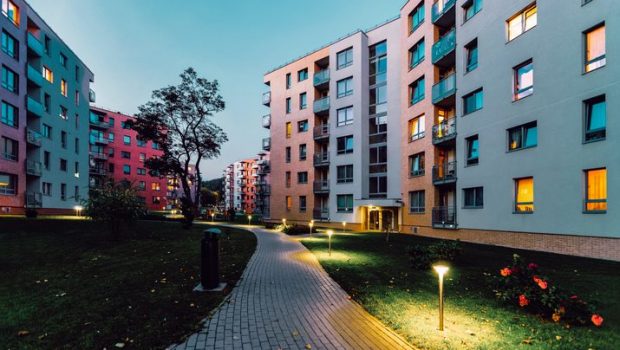The Cybersecurity Benefits of Smart Ecosystems
As news of data data breaches continues to become more common, now more than ever, security has grown to be a high priority for multi-family property owners. One data breach can irreparably damage a landlord’s reputation, putting residents at risk and the success of the property in jeopardy.
As a result of the pandemic catapulting remote real estate management, property managers have come to rely on smart ecosystems and the “Internet of Things” to get the job done. These collaborative networks of technologies have made it possible to provide digital security for both property owners and tenants.
Information Security
The modern world conducts business digitally. Paper has largely been replaced by digitally signed documents and electronic funds transfers, particularly with sophisticated apartment communities.
This means that resident and property information require secure digital storage to give tenants the confidence that their information is protected. Just as people once kept a file cabinet behind a locked door to discourage theft, they must now protect digital data to discourage identity theft. This guards the financial information of both the landlord and tenant.
Smart ecosystems can be beneficial in providing information security for multifamily operations. Using encrypted networks with efficient, easy-to-use software lets tenants pay their rent easily and stay confident that their personal, financial, and credit info is safe.
Today’s smart apartment landscape extends beyond digital payments, and multifamily property managers are integrating smart concepts throughout communities. More commonly today, properties offer smart apartment technology in the form of keypads and keyless entry systems, alarms, sensors, and more. Any device that is connected to personal and private information needs to be protected.
“All devices should function on a fully encrypted system, making it extremely difficult for identity thieves to hack into the system to access sensitive information,” says Chao Wang, COO of Arize, a leading provider of smart apartment technology and all-inclusive platforms that provides convenient, connected and secure living for multi-family property owners and residents nationwide.
Physical and Device Security
Physical devices present a particular digital security threat in that they can connect to networks wirelessly. Traditional WIFI on its own is somewhat insecure, but there are ways to let devices more securely connect wirelessly.
The Internet of Things further complicates the situation by increasing the number of connected devices on networks. It’s not just your computer or phone communicating wirelessly these days.
Devices like smart locks, leak detectors, motion sensors, security cameras, smoke detectors, and many others are all either communicating with each other, or with a central system that collects information they send.
If these devices are connected in a secure environment, they can provide important, real-time information to property managers that helps them better serve their tenants. They can also give tenants the convenience of keyless access to their apartments, as well as give trusted people access to their property when they aren’t home.
Best Practices for a Secure Ecosystem
When it comes to connected devices, they’re only as secure as the network they live on. While traditional WIFI falls short, there are ways of making a wireless network both robust and safe.
Local mesh networks are an option that can provide security that traditional WIFI doesn’t. Local mesh networks let you use multiple levels of encryption so that wireless devices can communicate while keeping the data packets traveling between them unreadable to unauthorized individuals.
“This allows devices to relay data to one another in small, but secure chunks,” Chao says. Wang also notes that encryption on these networks “blocks third parties from reading or modifying private data.”
Disaster recovery goes hand-in-hand with security, and secure cloud storage is an effective way to restore operations after a large loss of data. What was once only available to large companies is now very affordable (and a must-have) for everyday property owners as they build a complete security profile.
Along with secure networks and cloud storage, identity verification completes a final piece of the secure ecosystem pyramid. Things like two-factor authentication and requiring regular password changes are a first line of defense in keeping tenant information secure.
It Takes Two to Make A Thing Go Right
Property managers and residents working together can help to ensure that the risk of a cybersecurity breach is reduced as much as possible. Residents can keep up on identity verifications, such as two-factor authentications, to help protect themselves from security breaches.
Chao suggests that property management staff can aid in cybersecurity by implementing smart home ecosystems, like the Arize Smart Hub, which is Arize’s smart home ecosystem that features secure local mesh networks. Using encrypted cloud databases helps to prioritize information security.
Security comes in both informational and physical forms, especially for multifamily property owners. As today’s digitally-driven landscape continues to evolve, the multifamily industry must adapt alongside. Property managers that equip themselves with the right tools and resources to provide quality of living and sense of security, will be able to maintain a competitive advantage in the rapidly growing market.
John Boitnott is a journalist and digital strategist who has worked at TV, print, radio and Internet companies for almost 25 years. As a professional writer with a background in the newsroom, he has advised and created content for a wide variety of companies and publishers, helping them build their popularity. He has also written for Entrepreneur, Inc., BusinessInsider, Fortune, NBC, Fast Company, USA Today and Venturebeat.








Gloss